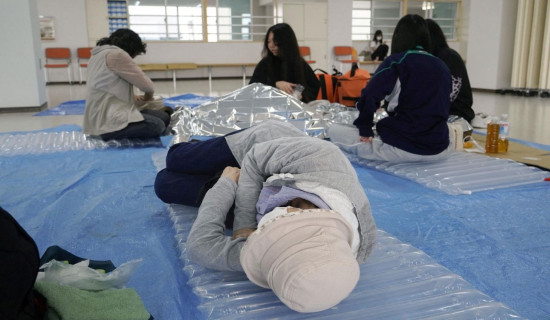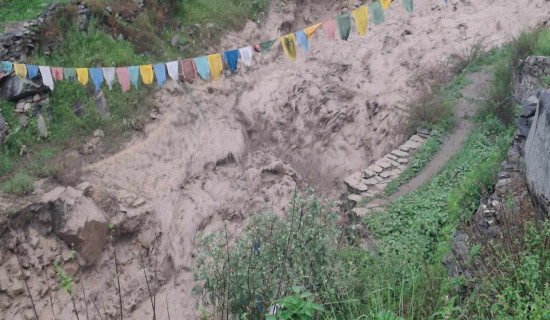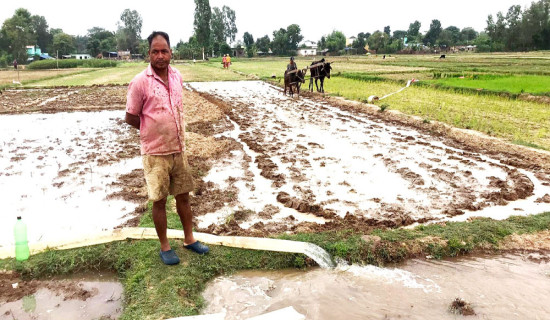- Wednesday, 30 July 2025
Israel, Iran trade strikes for a third day as nuclear talks collapse
Dubai, UAE, June 16: Israel unleashed airstrikes across Iran for a third day on Sunday and threatened even greater force as some Iranian missiles evaded Israeli air defenses to strike buildings in the heart of the country. Planned talks on Iran's nuclear program, which could provide an off-ramp, were canceled.
The region braced for a protracted conflict after Israel's surprise bombardment of Iran's nuclear and military sites on Friday killed several top generals and nuclear scientists, and neither side showed any sign of backing down. Iran said Israel struck two oil refineries, raising the prospect of a broader assault on Iran's heavily sanctioned energy industry that could affect global markets.
The Israeli military, in a social media post, warned Iranians to evacuate arms factories, signaling what could be a further widening of the campaign. Around noon local time, explosions were heard again in the Iranian capital, Tehran.
U.S. President Donald Trump has expressed full support for Israel's actions while warning Iran that it can only avoid further destruction by agreeing to a new nuclear deal.
Iranian Foreign Minister Abbas Araghchi said Sunday that if the Israeli strikes on Iran stop, then "our responses will also stop." He said the United States "is a partner in these attacks and must take responsibility."
New explosions echoed across Tehran and were reported elsewhere in the country early Sunday, but there was no update to a death toll released the day before by Iran's U.N. ambassador, who said 78 people had been killed and more than 320 wounded.
In Israel, at least 10 people were killed in Iranian strikes overnight and into Sunday, according to Israel's Magen David Adom rescue service, bringing the country's total death toll to 13. The country's main international airport and airspace remained closed for a third day.
Israeli strikes targeted Iran's Defense Ministry early Sunday after hitting air defenses, military bases and sites associated with its nuclear program. The killing of several top generals and nuclear scientists in targeted strikes indicated that Israeli intelligence has penetrated Iran at the highest levels. In a sign that Iran expects the Israeli strikes to continue, state television reported that metro stations and mosques would be made available as bomb shelters for the public beginning on Sunday night.
In Israel, at least six people, including a 10-year-old and a 9-year-old, were killed when a missile hit an apartment building in Bat Yam, near Tel Aviv. Daniel Hadad, a local police commander, said 180 people were wounded and seven are still missing.
An Associated Press reporter saw streets lined with damaged and destroyed buildings, bombed out cars and shards of glass. Responders used a drone at points to look for survivors. Some people could be seen leaving the area with suitcases.
Another four people, including a 13-year-old, were killed and 24 wounded when a missile struck a building in the Arab town of Tamra in northern Israel. A strike on the central city of Rehovot wounded 42.
The Weizmann Institute of Science, an important center for research in Rehovot, said "there were a number of hits to buildings on the campus." It said no one was harmed. Israel has sophisticated multi-tiered air defenses that are able to detect and intercept missiles fired at populated areas or key infrastructure, but officials acknowledge it is imperfect.
World leaders made urgent calls to deescalate. The attack on nuclear sites set a "dangerous precedent," China's foreign minister said. The region is already on edge as Israel seeks to annihilate Hamas, an Iranian ally, in the Gaza Strip, where the war is still raging after Hamas' Oct. 7, 2023, attack.
Prime Minister Benjamin Netanyahu brushed off such calls, saying Israel's strikes so far are "nothing compared to what they will feel under the sway of our forces in the coming days."
Israel, the sole though undeclared nuclear-armed state in the Middle East — said it launched the attack to prevent Iran from developing a nuclear weapon. The two countries have been adversaries for decades.
Iran has always said its nuclear program was peaceful, and the U.S. and others have assessed it has not pursued a weapon since 2003. But it has enriched ever larger stockpiles of uranium to near weapons-grade levels in recent years and was believed to have been able to develop multiple weapons within months if it chose to do so. The U.N.'s atomic watchdog censured Iran last week. (AP)







-square-thumb.jpg)

-original-thumb.jpg)







